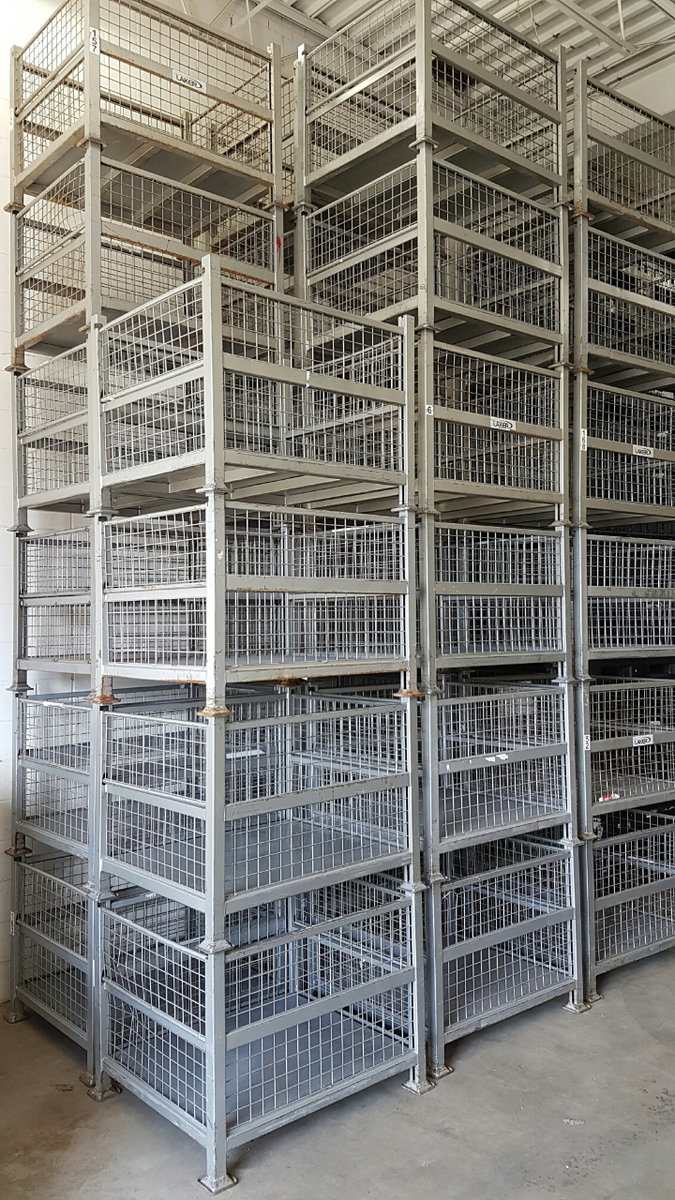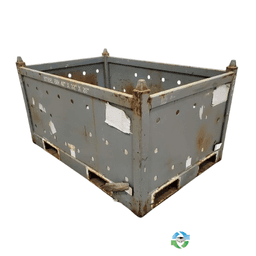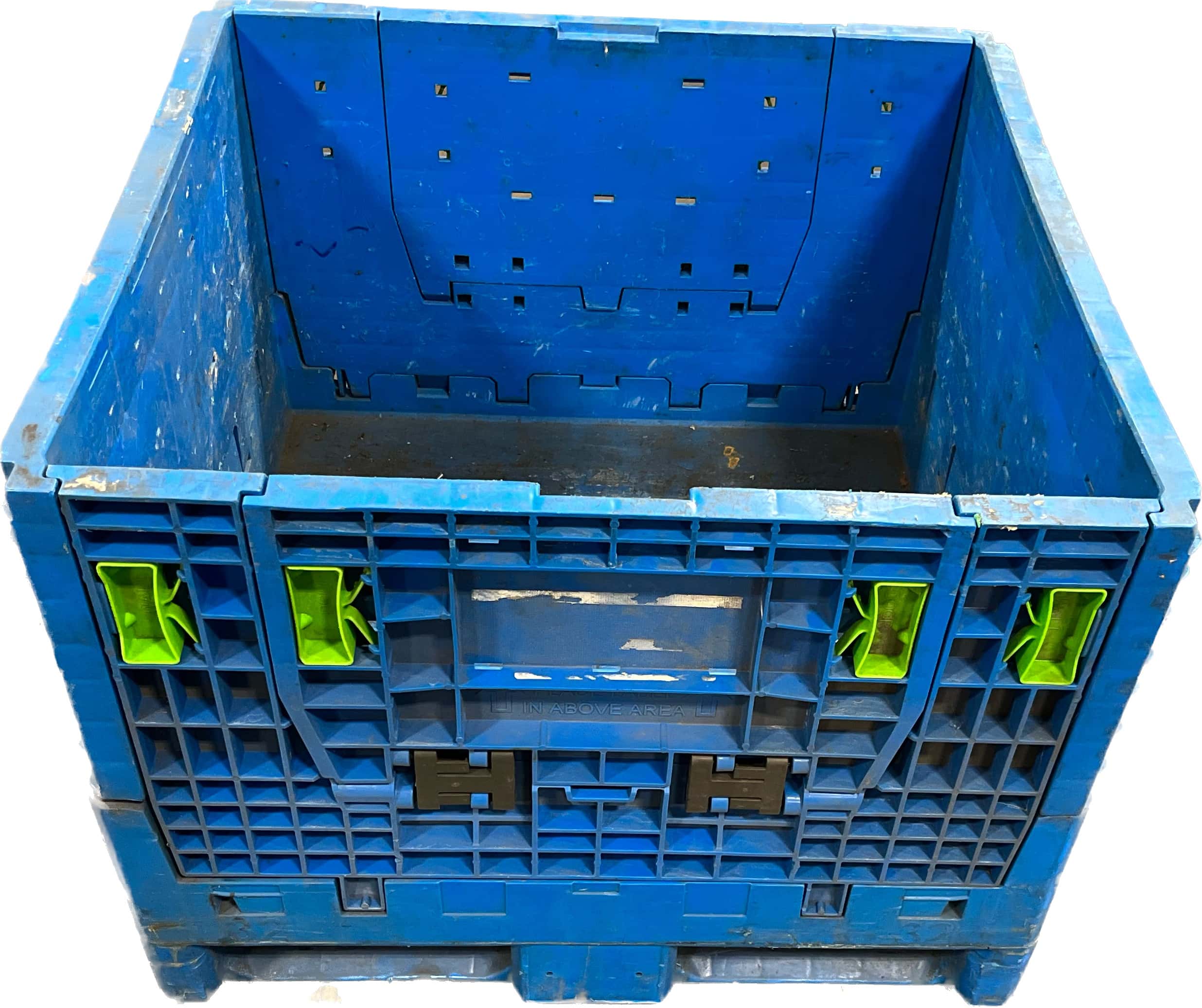Maximize your warehouse space with used collapsible bulk containers for streamlined handling
Wiki Article
Why Bulk Containers Are Vital for Lasting and Economical Transport
Bulk containers play a vital role in modern logistics. They help with the effective activity of huge amounts of products, thereby optimizing transport procedures. This technique not only lowers expenses however additionally minimizes environmental influence via reduced exhausts and waste generation. As markets look for more lasting methods, the fostering of mass containers is ending up being progressively substantial. What effects does this change hold for future logistics and supply chain monitoring?
The Advantages of Using Mass Containers in Logistics
Mass containers reinvent logistics by boosting efficiency and sustainability. These containers enable for the transport of large quantities of goods in a solitary journey, significantly decreasing the variety of journeys called for. This not just improves operations however likewise reduces labor expenses related to handling, packing, and discharging. Furthermore, mass containers are made to enhance area application within transportation lorries, ensuring that more products can be delivered concurrently.The standardization of bulk containers likewise simplifies the logistics process. With uniform measurements, they can be conveniently piled and saved, resulting in improved storage facility administration. Bulk containers frequently include long lasting materials that protect materials from damages throughout transit, thus decreasing item loss and enhancing overall integrity. As a result, companies can experience improved supply chain performance, inevitably bring about boosted success and customer satisfaction. This mix of aspects makes mass containers a critical possession in modern logistics.
Ecological Impact: Reducing Waste and Carbon Footprint
As sectors significantly focus on sustainability, the fostering of bulk containers has actually arised as a key approach for minimizing waste and reducing carbon footprints. These containers reduce the usage of product packaging materials, such as boxes and plastic, consequently notably reducing total waste generation. By consolidating shipments, bulk containers boost transportation effectiveness, enabling more products to be carried per journey. This decrease in journeys directly correlates with lower greenhouse gas discharges, adding to a smaller sized carbon footprint.Additionally, bulk containers can usually be reused or recycled, even more alleviating environmental impact. The resilience of these containers warranties they can stand up to multiple transportation cycles, decreasing the requirement for single-use choices. used collapsible containers. By simplifying logistics and advertising effective source use, bulk containers not just support lasting methods but also encourage markets to align with global environmental goals. Ultimately, their implementation shows a dedication to ecological stewardship and responsible resource management
Expense Cost Savings: Just How Bulk Containers Lower Transport Expenditures
While numerous companies look for means to improve their profits, making use of bulk containers presents a considerable possibility for reducing transportation expenditures. Bulk containers make best use of the quantity of goods transported, permitting organizations to deliver larger amounts simultaneously. This efficiency lowers the variety of trips called for, directly decreasing gas expenses and lessening labor expenses related to loading and discharging.Additionally, bulk containers usually include structured layouts that enhance space application within transportation automobiles. This indicates fewer voids, bring about a lot more effective usage of available ability. The toughness of bulk containers can reduce the threat of item damage throughout transit, making sure and reducing losses that more products get here undamaged.
Enhancing Supply Chain Efficiency With Bulk Storage Space Solutions
Mass storage space services play an essential function in enhancing supply chain effectiveness by optimizing inventory management. By settling goods right into less, larger containers, organizations can considerably lower handling prices related to regular transfers and processing. This structured technique allows for much better monitoring and monitoring of inventory, ultimately bring about boosted functional performance.Streamlined Stock Monitoring
Reliable stock administration is important for optimizing supply chain procedures, specifically when companies take on bulk storage remedies. These options make it possible for organizations to maintain greater stock degrees while lessening the frequency of replenishment. By combining products right into mass containers, firms can enhance their supply procedures, minimizing the complexity connected with tracking multiple smaller sized plans. This technique assists in precise inventory matters and improves forecasting precision, enabling even more informed decision-making. Additionally, mass storage remedies streamline storehouse company, making it much easier to find and access items when needed. As a result, companies can achieve a more reliable stock turn over rate, eventually boosting overall supply chain efficiency and lowering the likelihood of stockouts or overstock circumstances.
Reduced Handling Expenses
The application of mass storage solutions not just improves supply management however also considerably decreases taking care of costs across the supply chain. By combining products right into mass containers, companies reduce the demand for constant handling and transfer between different storage and transport devices. This strategy reduces labor expenses related to loading, unloading, and relocating smaller sized plans. In addition, bulk storage lowers the regularity of shipments, resulting in reduced transportation costs and decreased fuel consumption. Because of this, services can maximize their logistics procedures, enabling an extra efficient allocation of sources. Inevitably, lowered handling expenses add to boosted general supply chain efficiency, fostering an environment that supports both sustainability and economic practicality.
Convenience of Bulk Containers Across Different Industries
Although several industries have unique demands for transport and storage, mass containers have arised as a versatile option that fulfills a large range of needs. These containers, varying from large containers to specialized containers, can accommodate varied materials, including powders, granules, and liquids. In the farming market, mass containers promote the transportation of grains and plant foods, while the food and drink sector uses them for active ingredients and finished items. The chemical industry counts on bulk containers for safely transporting hazardous products, guaranteeing compliance with safety and security laws. In addition, building and construction companies take advantage of mass containers for moving accumulations and other materials. Their versatility expands to different settings of transport, consisting of ships, trucks, and trains, enhancing logistical performance. This convenience not only streamlines procedures throughout various markets yet likewise advertises sustainability by minimizing packaging waste and optimizing area en route. Mass containers play an essential duty in contemporary supply chain monitoring.Future Patterns wholesale Container Usage and Sustainability
The future of mass container usage is increasingly formed by ingenious materials development that enhances sustainability. In addition, automation in logistics guarantees to improve operations, minimizing waste and improving effectiveness. Embracing round economic situation methods will additionally reinvent how bulk containers are designed, utilized, and reused, fostering a much more lasting transportation landscape.Innovative Products Development
As markets increasingly prioritize sustainability, ingenious products development in bulk containers arises as a significant consider boosting environmentally friendly transport options. Producers and scientists are checking out biodegradable plastics, recycled compounds, and light-weight metals to decrease environmental impact. These materials not just decrease waste however additionally boost fuel efficiency by lowering the general weight of containers. Furthermore, advancements in wise products, which can adapt to varying conditions, boost the sturdiness and functionality of mass containers. The assimilation of these innovative materials aligns with circular economic climate principles, promoting reuse and recycling. As the demand for sustainable practices grows, the development of such products will play an important role in shaping the future of bulk container use in logistics and transport.Automation in Logistics
Substantial innovations in automation are positioned to change logistics and the usage of bulk containers, enhancing sustainability in transportation. Automated systems, including drones and self-governing vehicles, are streamlining the movement of bulk containers, decreasing the reliance on conventional fuel-powered transportation. These technologies optimize transmitting and filling processes, reducing vacant miles and boosting gas effectiveness. Additionally, automated supply monitoring systems improve tracking and surveillance of mass containers, making certain much better resource appropriation and reduced waste. The integration of the Net of Things (IoT) allows real-time data analysis, allowing proactive decision-making that lines up with sustainability goals. As automation proceeds to progress, it is anticipated to drive additionally advancements wholesale container use, ultimately supporting even more sustainable logistics techniques and decreasing the environmental influence of transport.Circular Economy Practices
Innovations in automation are setting the phase for a much more integrated strategy to circular economy methods in the domain name of mass container usage. As sectors progressively embrace sustainability, mass containers are being developed for long life and reusability. This shift not just lessens waste yet likewise boosts resource efficiency. Firms are adopting methods such as closed-loop systems, where made use of containers are collected, refurbished, and reestablished right into the supply chain. In addition, smart innovations track container life cycles, facilitating much better monitoring and decreasing ecological effect. The collaboration between producers, logistics service providers, and end-users is necessary in establishing standards for sustainable container use. check here used plastic containers. Future trends suggest an expanding focus on products that are recyclable and eco-friendly, more strengthening the circular economic climate's concepts wholesale transportation
Regularly Asked Concerns
What Products Are Mass Containers Typically Made From?
Mass containers are usually built from durable products such as high-density polyethylene, cardboard, aluminum, and steel. These materials provide convenience, strength, and security, making them ideal for transferring different products in different markets successfully.How Do I Select the Right Dimension Bulk Container?
Picking the appropriate dimension mass container includes reviewing the quantity of products to be transported, considering dealing with devices compatibility, and assessing storage space needs. Correct dimension assurances performance in transport and decreases waste throughout shipment.Are Bulk Containers Reusable or Recyclable?
Bulk containers are typically recyclable, created for several journeys, boosting sustainability. Lots of can likewise be recycled, relying on the products used. Picking recyclable alternatives even more reduces and sustains environmental objectives waste in transport methods.What Safety Laws Put On Mass Container Transport?
Security policies for mass container transportation consist of compliance with the Division of Transport guidelines, correct labeling of unsafe products, architectural honesty analyses, and adherence to weight limitations to assure risk-free handling and stop mishaps during transportation.Just How Can Businesses Change to Making Use Of Mass Containers Effectively?
Businesses can change to bulk containers by reviewing existing logistics, educating team on handling, investing in ideal tools, optimizing stock administration, and teaming up with suppliers to ensure compatibility and efficiency throughout the supply chain.
As sectors significantly focus on sustainability, the adoption of bulk containers has actually arised as a crucial technique for minimizing waste and reducing carbon impacts. By settling products into mass containers, firms can streamline their stock procedures, reducing the intricacy linked with tracking several smaller sized packages. As industries significantly focus on sustainability, innovative products growth in bulk containers arises as a significant aspect in enhancing environment-friendly transportation services. Automated systems, including drones and self-governing lorries, are streamlining the movement of mass containers, lowering the reliance on standard fuel-powered transportation. In addition, automated stock monitoring systems boost tracking and surveillance of mass containers, making certain much better resource allocation and decreased waste.
Report this wiki page